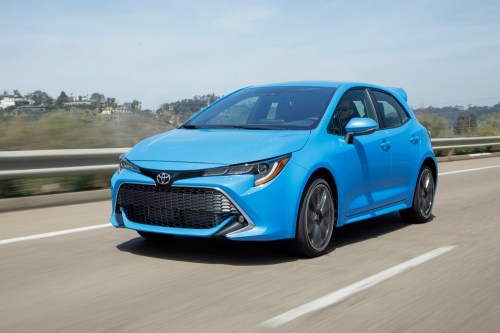
Toyota for years cited legitimate safety and privacy concerns as reasons not to offer its cars with Android Auto and Apple CarPlay compatibility. It took its first step toward letting the two tech giants into its dashboards when it added CarPlay to some of its models — including the all-new 2019 Avalon and Rav4— in January 2018. Now, it has finally opened the door to Google at the 2019 Chicago Auto Show.
Confirming an earlier report, Toyota has announced that a handful of cars in its lineup will gain Android Auto compatibility for the 2020 model year. The list includes the popular Tacoma (which received a mid-cycle update at the Chicago show), the rugged 4Runner, the spacious Sequoia, and the Tundra pickup. All of these vehicles benefit from an improved infotainment system displayed on either a 7.0- or an 8.0-inch touchscreen depending on the trim level selected. It’s reasonable to assume most of the company’s other models will gradually gain Android Auto compatibility, including possibly the Supra, but Toyota is keeping its lips sealed for the time being.
The announcement takes Toyota off the shrinking list of Android Auto holdouts. Bentley offers Apple CarPlay compatibility but it has no plans to add Android Auto integration anytime soon for reasons similar to those stated by Toyota when it resisted the software. In 2018, the Japanese firm explained it wasn’t convinced Google was doing enough to protect user data, and noted it wasn’t certain Android Auto played a significant role in reducing distracted driving. It seems to have found a common ground with Google.
Porsche is Apple-only, too, though Digital Trends learned it’s preparing to offer Android Auto compatibility “in the near future.” Some BMW models (including the gasoline-electric i8 sports car) aren’t compatible with Google’s infotainment system either.
There’s no word yet on whether Lexus, Toyota’s luxury division, will offer Android Auto compatibility as well. Chad Deschenes, a product trainer at the Lexus College, told Digital Trends the company is open to making the software available sooner or later but has no firm plans to do so. The company knows it’s a feature in hot demand, but Deschenes pointed out that a full 80 percent of Lexus owners own an Apple-powered device.
Updated 2-7-2019: Added confirmation that Toyota will offer Android Auto.
Editors' Recommendations
- CES 2023: BMW is going all-in on Android Auto Open Source – here’s why
- Motorola MA1 gives your car wireless Android Auto
- The best Android Auto head units
- How to update Android Auto
- What is Android Auto?